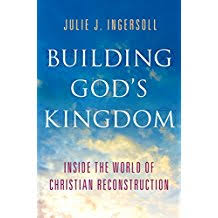The degree to which Trump seems an unlikely Evangelical standard bearer has been widely explored. See for example, Sarah Posner and Christopher Stroop for insightful analyses. Certainly the alt right and authoritarian threads are important. So is the argument that some aspects of the Trump agenda/persona are merely tolerated by evangelicals because they care more about fighting abortion/LGBTQ rights and “preserving” their privilege in the name of religious freedom.
But the support for tax cuts, over assistance for those in need, is not just a gift from Trump to his rich friends, tolerated by evangelicals because they care more about other issue. These budget cuts are in keeping with the religious right’s understanding of a Biblical worldview, and have long been at the very core of its agenda.
In Building God’s Kingdom, I explore the framework rooted in the Reformation with the work of Abraham Kuyper and popularized in unique versions by Francis Schaeffer and R.J. Rushdoony. The religious right builds on a notion of “sphere sovereignty” to develop an overarching theory of how the bible speaks to every area of life. According to Sphere Sovereignty, God has delegated authority to men (they usually do mean men) in three distinct spheres of government: family government, ecclesiastical government, and civil government and these three spheres have specific and limited roles.
In this view the role of civil government is limited to the protection of property and the punishment of criminals. It is primarily the obligation of the family to assist the poor, and secondarily the obligation of the church to assist those who can’t receive the help they need from family. If the civil government uses tax money to help the poor it is understood as tyrannically exceeding its biblical authority, and effectively stealing money to do so (they call such misused taxes legalized theft).
You find this position articulated in rather arcane theological form in the work of Rushdoony and other Christian Reconstructionists but you also find it popularized in more mainstream evangelical circles by people like David Barton on his radio show Wallbuilders. It is promoted in books, conferences and Christian school/home school curriculum; in its softest versions it is promoted widely in conservative American Protestantism. Its harshest version denies help to the poor who are “unrepentant” and remain outside the covenant community of Christians.
This is also the underpinning for any number of other administration policies and why so many Trump appointees literally oppose the efforts of the agencies they lead. Case in point, the Department of Education is led by one who believes that education is the responsibility of the family and that the civil government doesn’t have authority in this sphere. It’s unlikely that Donald Trump has any such theoretical underpinnings but you can bet Mike Pence does and he’s already ensuring that this dominionist “biblical worldview” shapes the administration’s policies.



 RSS Feed
RSS Feed
